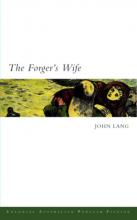The Forger's Wife, John Lang
Grattan Street's Colonial Fiction project is an outstanding idea, with 4 titles now available (https://grattanstreetpress.com/capf/(link is external)), starting out with a reprint of John Lang's THE FORGER'S WIFE from the early 1850's. Originally a serialised novel in Fraser's Magazine, this imprint comes with the observation that it is Australia's first detective novel.
A note on the author to start out, John Lang was, according to the publisher, Australia's first locally born novelist (to distinguish him from Fergus Hume who was born in the UK). Born in Sydney in 1816, he was educated there, before heading off to Cambridge in 1837, subsequently becoming a barrister. Later in life he was to head to India, and after turning to journalism started a paper in the city of Meerut in Utter Pradash. His novel writing seems to have commenced with serialised versions of his work appearing in his own paper, and in Fraser's Magazine (for Town and Country) in London. He died in India sometime after a trip to London in 1859, and he's buried in the Camel's Back Cemetery in the famous hill station Mussoorie in India.
Needless to say a colourful life, reflected in THE FORGER'S WIFE, with a strong feeling of the willingness of people at that time to up stumps and move to wherever fortune might take them.
THE FORGER'S WIFE is, as was fairly common for the time, essentially a melodrama centred around the story of Emily Orford, the over-protected, naive only child of a well-to-do British Army Officer. Despite a plethora of "suitable suitors", Emily manages to marry her choice - one Captain Reginald Harcourt, aka Charles Robert, the forger. After they elope, he's promptly arrested, convicted of forgery and transported to Australia. She believes he is an innocent and wronged man, and takes off to Sydney in his wake, determined to save her marriage and prove her love worthy (you'll recognise the form of twaddle). Upon her arrival in Sydney she is extremely fortunate to come across our detective and hero of the piece, convict turned policeman George Flower. When she does eventually re-establish marital bliss with Harcourt / Robert she believes in him, despite any number of outrageous schemes, no matter who dire his deeds, no matter how put upon her wifely devotion becomes, all to the mild frustration of Flower who knows exactly what sort of a rogue Robert really is. Exactly, therefore, in the style of the times, which is very easy for us to be slightly underwhelmed by nowadays.
The strength of THE FORGER'S WIFE however is in the little details, the asides and the observations gleaned through conversation and description. These provide real insight into society and people's thinking at the time.
There are hints about attitudes to Government impracticality and lack of connection with the average punter that ring true today. There is clear evidence of the lack of respect in which Aboriginal people were held, simply due to difference, and a complete lack of understanding or respect for that difference. Right down to the comparable attitudes towards the forger, thief, liar and serial bad husband, as opposed to local Aboriginal people who are fighting for the desire not to be wiped off the face of their own country... There are also reminders that Australia is a harsh climate, and that harshness is often reflected in the people and their behaviour, to say nothing of the extent to which survival can be a struggle. There is also an underlying reminder of the basic requirements for survival in pioneer states - wily cunning, good instincts and often the help of those more experienced. All too expectedly, there's also the non-too-subtle suggestion that for a woman to survive, she will need the help of good men.
That opportunity to see the past, without the "disinfecting" of historical re-framing is what is most interesting about historical fiction like THE FORGER'S WIFE. It's also particularly interesting to note that always and forever, crime fiction is the vehicle through which so many novelists take a good, pointed look at the world in which they live. Ultimately it's what makes a project like Colonial Fiction so important as it keeps the honest voices of the past alive for us to remind ourselves of what we truly were.
John Lang was Australia's first locally born novelist, publishing early work in Sydney in the 1840s and going on to write several bestsellers. The Forger's Wife (1856) is a lively adventure novel, set in an unruly colonial Sydney where everyone is on the make. The forger's wife is a young woman who follows her rakish husband out to Australia and struggles to survive as her marriage falls apart. She soon meets detective George Flower, a powerful man with a cavalier sense of justice and retribution. Flower literally controls the fortunes of the colony: taking on the local bushrangers, instructing colonial authorities, and helping himself to the spoils along the way.
First serialised in Fraser's Magazine in 1853, The Forger's Wife was popular in its day and was reprinted many times over. It is Australia's first detective novel – and most likely, the first detective novel in the Anglophone world.
'It is a powerful, if occasionally painful, book. It sells even now in all the colonies and in England by the thousand...'
Rolf Boldrewood (1893).
| Review | The Forger's Wife, John Lang | Karen Chisholm
|
Wednesday, May 23, 2018 |
| Blog | Was Reading - The Forger's Wife, John Lang | Karen Chisholm
|
Wednesday, January 3, 2018 |

